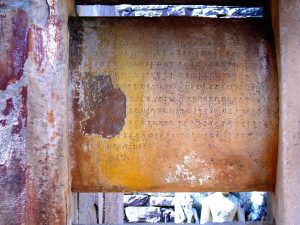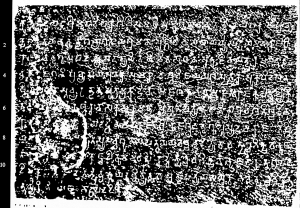

1-7) Luck! To the venerable (Buddhist) confraternity, in the prosperous Great Convent of Kākanādaboṭa, in which the organs of sense (of its members) have been perfected by such qualities as piety, meditation and wisdom—which is considered to be the highest field of merit—which has gathered together from the four quarters of the world, (and) which is the abode of most eminent Śramaṇas, having prostrated himself in a circle of five (limbs), Āmrakārdava, son of Undāna, whose means of subsistence has been augmented through the favour of the feet of the mahārājādhirāja, the prosperous Candragupta (II), who is proclaiming to the world the faithful spirit of a dependent who is an excellent man, whose banner of fame was the victories achieved in many battles, (and) who is an inhabitant of (the town of) Nashṭī… in the Sukuli country—gives Īśvaravāsaka… purchased with the price of the palaces Maja, Śarabhaṅga and Āmrarāta; and twenty five dīnāras (as a permanent endowment);
7-9) with the (first) half of which, let five (Buddhist) mendicants be fed, and let a lamp burn in the jewel house, as long as the moon and the sun (endure), for the attainment of all virtues by the mahārājādhirāja, the prosperous Candragupta (II) whose favourite name is Devarāja;
9-10) with other half, which is mine, let the same number of mendicants be fed, and let (a lamp) burn in the jewel-house.
10-11) Whosoever breaks up that same arrangement, shall become infected with the killing of a cow or of a Brāhmaṇaand with the five sins that cause immediate retribution.
11) (In) the year 90 3, (on) the day 4 of Bhādrapada.